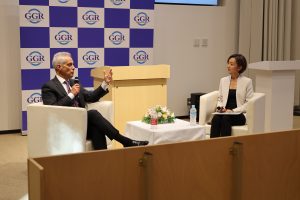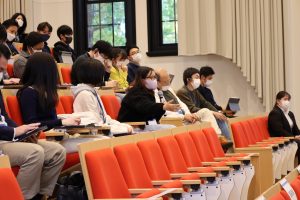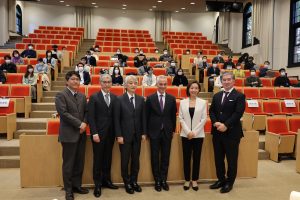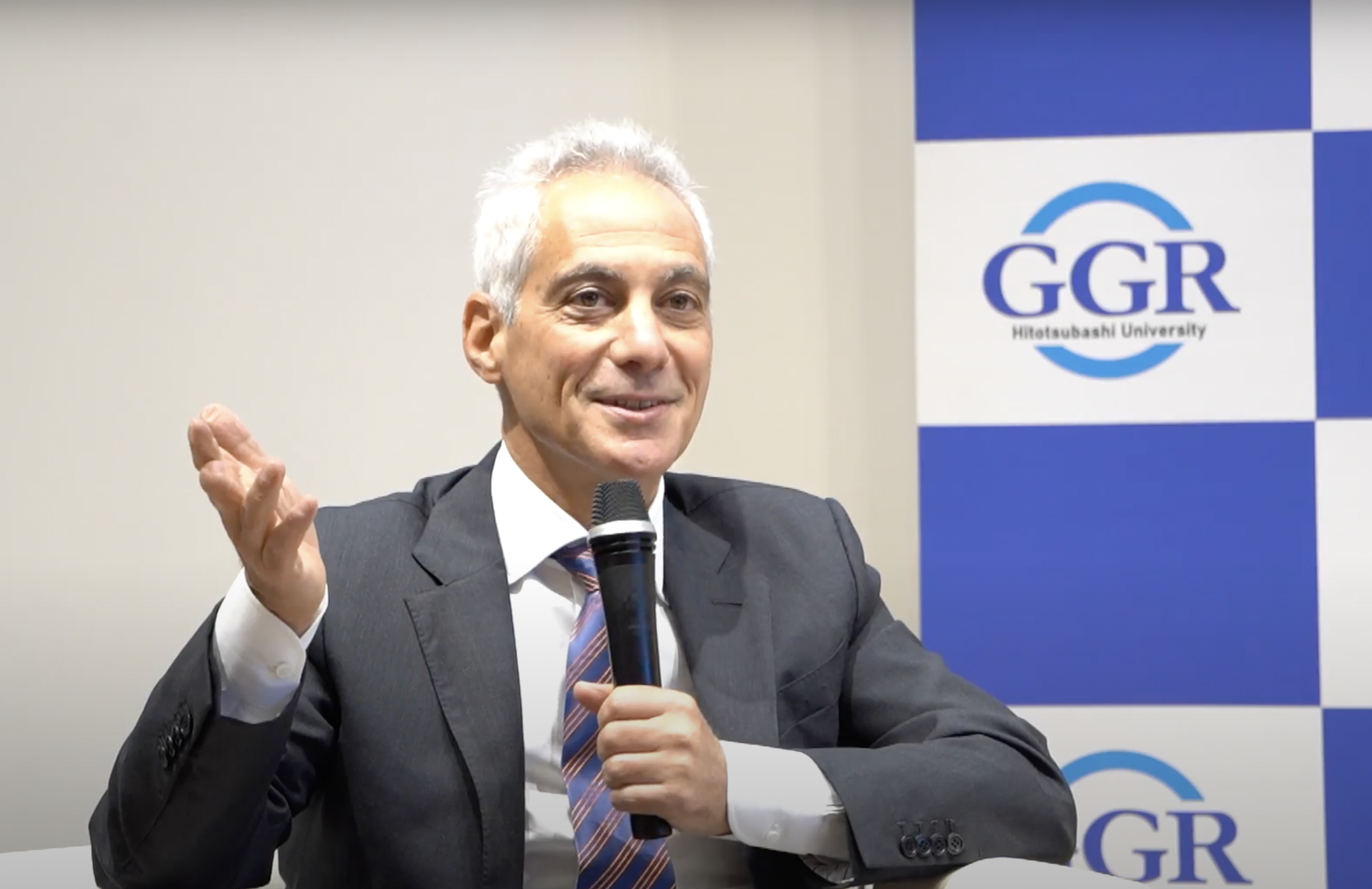On November 21, 2022, the Institute for Global Governance Research (GGR) had the honor of welcoming the Honorable Rahm Emanuel, US Ambassador to Japan, give a special talk titled “Free and Open Indo-Pacific and the US-Japan Relations.” The session was co-hosted with the U.S. Embassy in Japan at the Intelligent Hall, Hitotsubashi University. Approximately 55 Hitotsubashi students and professors attended the session. The event began with welcome remarks by President Satoshi Nakano of Hitotsubashi University, which was followed by the Ambassador’s responses to questions from Professor Maiko Ichihara, and Q&A between students and the Ambassador.
The session with Professor Ichihara offered a stimulating discussion on the aspects of freedom and openness of the Free and Open Indo-Pacific (FOIP) vision and the roles of Japan and civil society. The Ambassador contrasted the repression and rigged elections in China and Russia with the healthy condition of democracy under the Biden administration, as free elections were held with high participation. Election results were accepted not only in the United States but also in other countries such as Brazil, Israel, and France, noted the Ambassador. The Ambassador emphasized the need to expand the value of the FOIP with Japan as a partner, stating that the success of democracy in domestic affairs will spill over to foreign policy.
The Ambassador noted that Japan and the US have different challenges, but pointed out the strategic importance of the US to Asia, as evidenced by participation in the G20 held in Indonesia and Vice President Harris’s participation in APEC. The Ambassador also spoke highly of the penetration of norms in Asia, as eight of the ten Asian countries voted in favor of the resolution condemning Russia at the UN General Assembly on March 3, 2022, where four countries joined in co-sponsoring the resolution. The Ambassador also mentioned the importance of projecting norms of freedom, rule of law, and respect for the individual through civil society and cultural engagement, referring to the democratization of South Korea and Taiwan.
During the session with students, the discussion widely ranged from the local to the national political level, and from European to Asian affairs. First, the Ambassador noted that his background as mayor of Chicago has allowed him to work more closely and intimately with civil society than is possible as a diplomat, and that local governments can play greater roles in addressing issues such as minorities’ rights and climate change than can be accomplished at the national level. The Ambassador also remarked that Japan needs to work with the US to project norms and values into the Indo-Pacific region.
Regarding Russia’s invasion of Ukraine and alliance politics, the Ambassador praised President Biden’s continued support for Ukraine and stated that Russia cannot win the war because the invasion has led to Sweden and Finland’s decision to join NATO, and that Russia continues to lose at key points despite the difference in scale between Ukraine and Russia. The Ambassador then stated that it is obvious that the US has an obligation to defend the integrity, freedom, and independence of Japan, which, unlike Ukraine, is an official ally of the US.
The Ambassador also took a tough stance on China, saying that the US cannot play the fool anymore. The Ambassador pointed out that economic coercion on Japan, South Korea, Australia, and Lithuania has revealed the dangers of economic dependence, and that international trust has been shaken by the abandonment of the one country, two systems in Hong Kong, and the maritime dispute with the Philippines. The Ambassador stated the need to prepare for China’s challenge, and argued that the US stance, that the use of the military means against Taiwan is unacceptable, has not changed.
In addition, the Ambassador stressed the need for continued dialogue with allies who do not necessarily accept shared norms. The Ambassador pointed out that smaller and more vulnerable countries will be in peril if Russia’s barbaric behavior becomes an accepted norm. Although Thailand, a US ally, did not vote in favor of the resolution condemning Russia’s invasion, the Ambassador discussed the importance of continuing the dialogue with Thailand without cutting the relationship.
The students who attended the session offered a variety of feedback. A Taiwanese student said that the Ambassador’s strong commitment to East Asia made them realize that Taiwan still needs the US, and international students were impressed by the Japanese students’ enthusiasm for US-Japan relations.
【Event Report prepared by】
NAKAJIMA Takahiro (Undergraduate student, Faculty of Law)





